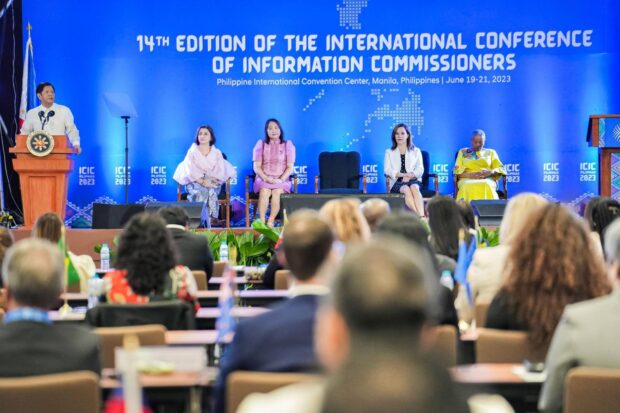
MEDIA LITERACY | President Ferdinand Marcos Jr., during the opening ceremony of the 14th Edition of the International Conference of Information Commissioners in Pasay City on Monday, June 20, 2023, says the government will undertake a massive media literacy campaign to fight misinformation and disinformation. (MALACAÑANG PHOTO)
MANILA, Philippines — President Ferdinand Marcos Jr. on Monday called on government agencies to uphold the people’s freedom of information (FOI) as he vowed to continue fighting fake news in the country.
“Like everyone here, we too recognize as a matter of principle that fake news should have no place in modern society,” he said at the opening of the International Conference of Information Commissioners (ICIC) held at the Philippine International Convention Center.
The ICIC is a global network linking commissioners, ombudsmen, and other authorities overseeing the implementation of legislation and policies on access to public information.
The president commended the ICIC for its efforts in fostering the right to access to information.
“The Philippines stands in solidarity with the ICIC and the entire international community in this advocacy. As a nation with a robust democracy, we reaffirm our commitment to champion this basic human right. It remains indelibly etched in our fundamental law,” he said.
Marcos also assured his audience of the continued implementation of the FOI program in the executive branch and among all government agencies, as he urged them “to genuinely uphold and give effect to the people’s FOI in the course of our day-to-day operations, with good faith and with openness.”
“[T]he FOI program has greatly advanced the campaign against misinformation and disinformation in the country—a problem that we in the Philippines also suffer from as, I guess, all of us do around the world,” he said.
‘Serious problem’
Fake news has been widely regarded as an undermining factor in public discourse and news reporting here and overseas.
A survey by the Social Weather Stations in February 2022 showed 69 percent of its respondents saying that fake news was a “serious problem” in the country.
In 2017, a University of Oxford study found that the camp of then-President Rodrigo Duterte spent $200,000 — or about P10 million — for his social media campaign during the 2016 presidential race.
US-based rights group Freedom House said also in 2017 that the Duterte administration was operating fake social media accounts to attack its critics, employing what it called “a keyboard army.”
Duterte himself admitted that year that he paid “trolls,” but only during the 2016 campaign.
His administration would be hounded by accusations that it exploited fake news—such as in 2021 when the Senate sought an inquiry into reports that state funds were being used for fake news operations.
In the 2022 election campaign, then-presidential candidate Ferdinand Marcos Jr. said he was offered troll farms to boost his campaign, but said he did not avail himself of this.
“We have no trolls. None. Not a single one. I have been offered a click army. I’ve been offered a troll. I did not use it,” he told CNN in an interview at that time.
Tsek.ph, an academe-based fact-checking initiative, said in February that year that Marcos had become a beneficiary of misleading social media messaging, while Twitter suspended hundreds of accounts allegedly linked to his supporters for violating its rules.
FOI policy
Despite accusations against Duterte and Marcos that they benefited from social media propaganda, it was Duterte who issued Executive Order No. 2 (series of 2016) laying down an FOI policy in the government — which Marcos said he would strengthen.
Marcos enumerated in his speech the current initiatives under the FOI program during his administration’s watch.
“We will undertake a massive media and information literacy campaign, which shall be digital, multimedia, and youth-oriented,” he said, adding that part of that effort would be an “e-governance initiative aimed at digitalizing and streamlining government services from the national to the local levels.”
Marcos also said the executive branch is working with Congress in crafting an e-governance law that would serve the people’s complementary rights to free information and good governance.
He said these principles were at the core of his administration’s Philippine Development Plan for 2023 to 2028.
‘Our best interest’
Marcos said the ICIC had been “globally instrumental in promoting full human development, by shaping minds, by shaping our consciousness.”
“Undeniably, this is to our best interest as a nation. It is a key to our pursuit of good governance, improved public services, and a more progressive and sustainable society,” he said.
The Philippines is the first Asian and Southeast Asian country to host the conference, which is now in its 20th year.
Previous conferences were held in Mexico (2005 and 2022), South Africa (2004 and 2019), the United Kingdom (2017 and 2006), Chile (2015), Germany (2013 and 2003), Canada (2011), Norway (2009) and New Zealand (2007).
The Presidential Communications Office (PCO), through its Freedom of Information Program Management Office, is hosting the conference which ends on Wednesday.
Communications Secretary Cheloy Velicaria-Garafil said the PCO’s hosting showed that “the Philippine government recognizes access to information as a fundamental human right that must be upheld.”